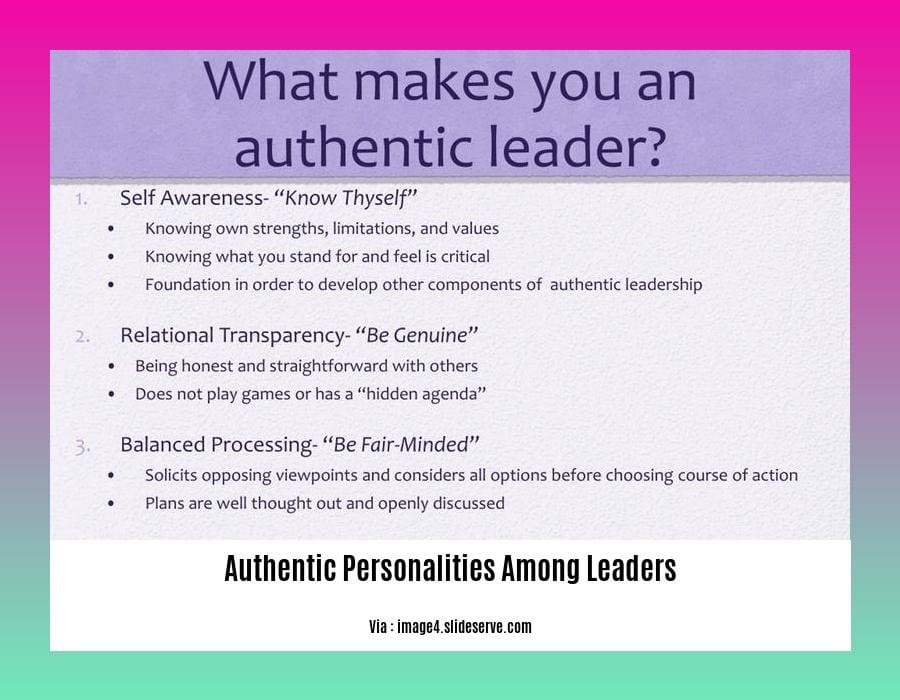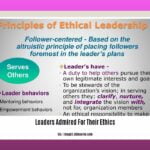The significance of authentic personalities among leaders cannot be overemphasized. Authentic leaders are individuals who are genuine, transparent, and true to themselves. By embracing their true selves, these leaders create a culture of trust, respect, and open communication. Authenticity is the cornerstone of trust and success, leading to higher levels of employee engagement, innovation, and organizational performance.
Key Takeaways:

- Authentic leaders prioritize personal growth and strive for self-improvement.
- They have a clear understanding of their own strengths, weaknesses, and values.
- Authentic leaders maintain a consistent focus on their goals and responsibilities.
- They align their actions with their organization’s purpose and values.
- Authentic leaders inspire trust and confidence in their followers.
Authentic Personalities Among Leaders
Authenticity has become a crucial leadership quality in today’s dynamic business landscape. Authentic leaders possess genuine personalities that resonate with followers, building trust and inspiring success. Here are some key characteristics and benefits of authentic personalities among leaders:
Benefits of Authentic Leadership:
- Trustworthy Relationships: Authenticity fosters genuine connections, allowing leaders to establish strong relationships and build trust among their teams.
- Innovative Mindset: Authentic leaders encourage diverse perspectives by valuing authenticity, which promotes innovation and creative problem-solving.
- Engagement and Well-being: By creating a transparent and inclusive work environment, authentic leaders increase employee engagement and overall well-being.
- Transparency and Integrity: Authenticity builds transparency and integrity, ensuring that leaders’ words align with their actions, fostering credibility and trust.
Challenges of Authentic Leadership:
- Vulnerability: Authenticity requires leaders to share personal experiences, which can be challenging and expose vulnerabilities.
- Maintaining Consistency: Authentic leaders must consistently demonstrate genuineness in their actions and behaviors to maintain trust and credibility.
- External Pressures: Leaders may face external expectations to conform to traditional norms, which can stifle authenticity.
Strategies for Cultivating Authenticity:
- Self-Reflection: Regularly reflect on your values, strengths, and weaknesses to understand your authentic self.
- Feedback and Support: Seek honest feedback from trusted colleagues and seek support from mentors who can provide valuable insights.
- Vulnerability and Transparency: Share personal experiences that resonate with others, creating a sense of connection and relatability.
- Practice Mindfulness: Pay attention to your thoughts, feelings, and how your actions impact others, developing self-awareness and authenticity.
- Role Modeling: Demonstrate authenticity in your own leadership style, encouraging others to embrace their genuine personalities.
By embracing these strategies and understanding the benefits and challenges of authentic personalities among leaders, organizations can harness the power of genuineness to build strong teams, foster trust, and drive success.
Voters who are tired of untrustworthy and fake political leaders must meet political leaders who are being praised for their authenticity. These are the most genuine, real political leaders who are admired for being true to themselves and delivering tangible results, so participate actively to support them in the upcoming election.
Strategies for Cultivating Authenticity
Authentic leaders, like a beacon of trust and success, illuminate the path for their teams, forging strong bonds and inspiring innovation. By embracing their true selves and fostering genuine connections, they unleash a ripple effect of positivity throughout their organizations.
Benefits of Cultivating Authenticity
- Stronger relationships, like sturdy bridges, connect leaders with their teams, building a foundation of mutual respect and understanding.
- Trust, as transparent as a mountain stream, flows naturally when leaders are genuine, establishing a climate of open communication and collaboration.
- Team engagement soars when leaders create an environment where individuals feel valued, empowered, and connected to a shared purpose.
- Innovation blossoms in the fertile soil of diversity when authentic leaders welcome different perspectives and encourage creative thinking.
Strategies for Cultivating Authenticity
1. Self-Reflection: A Mirror to Your Soul
Embark on a journey of self-discovery, reflecting on your values, beliefs, and the impact your actions have on others. This introspection will illuminate the path to a more authentic and effective leadership style.
2. Feedback: A Compass for Growth
Seek honest and constructive feedback from trusted colleagues or mentors. Their insights will help you identify areas for improvement and refine your authentic leadership approach.
3. Vulnerability: The Courage to Be Real
Share personal experiences and perspectives that resonate with others, fostering a sense of connection and transparency. Remember, vulnerability is not weakness but a sign of strength and authenticity.
4. Boundaries: A Clear Path
Set clear professional boundaries while remaining approachable and authentic in your interactions. Respecting these boundaries will maintain a healthy work environment and build trust.
5. Mindfulness: The Key to Inner Harmony
Practice mindfulness to become more aware of your thoughts, feelings, and the impact of your actions on others. This self-awareness will enhance your ability to lead authentically and empathetically.
6. Modeling Authenticity: Leading by Example
Encourage your team members to embrace their authentic selves by demonstrating authenticity in your own leadership style. Your example will create a ripple effect of authenticity throughout the organization.
Key Takeaways:
- Authenticity fosters trust, strengthens relationships, and fuels innovation.
- Self-reflection, feedback, and vulnerability are key to cultivating authenticity.
- Set clear boundaries while maintaining approachability and transparency.
- Mindfulness promotes self-awareness and enhances authenticity.
- Modeling authenticity creates a positive work environment and inspires others.
Source: Forbes: Strategies To Develop Authentic Leadership
Benefits of Authenticity in Leadership
Authenticity has become increasingly valuable in leadership, fostering trust and creating positive outcomes within organizations. Leaders who embrace their true selves experience numerous benefits that can enhance their effectiveness and the well-being of their teams.
Stronger Relationships:
Authenticity creates a foundation for genuine connections, fostering strong relationships with team members, colleagues, and stakeholders. By demonstrating vulnerability and sharing personal experiences, leaders build trust and create a sense of belonging.
Increased Trust:
Authentic leaders establish a culture of openness, honesty, and respect. They are seen as trustworthy and reliable, which encourages collaboration and decision-making based on shared values.
Improved Engagement:
Teams led by authentic leaders tend to be more engaged and motivated. A sense of purpose and connection inspires individuals to contribute their unique perspectives and work towards a common goal.
Enhanced Innovation:
Authenticity promotes diversity of thought. Leaders who embrace their true selves create an environment where individuals feel comfortable sharing their ideas and opinions, fostering innovation and creative problem-solving.
Improved Well-being:
Authentic leaders prioritize personal growth and well-being. They balance team dynamics, tasks, and project needs to optimize outcomes while maintaining a healthy work-life balance.
Overcoming Challenges to Authenticity:
Cultivating authenticity can pose challenges, such as societal pressures, self-doubt, and maintaining consistency. However, there are strategies leaders can adopt to overcome these obstacles and fully embrace their authentic selves.
Key Takeaways:
- Authentic leadership fosters trust, builds strong relationships, and inspires engagement.
- It promotes innovation, diversity of thought, and personal growth.
- Leaders can overcome challenges to authenticity through self-reflection, seeking feedback, and modeling authenticity.
Most Relevant URL Source:
Authentic Leadership: What It Is & Why It’s Important by Harvard Business School Online
Challenges of Authenticity in Leadership
Navigating the Challenges of Authentic Leadership
Being an authentic leader is not without its challenges. Here are some roadblocks you may encounter:
Social Pressure: Societal norms and organizational expectations can pressure leaders to conform, suppressing their true selves.
Self-Awareness: Cultivating authenticity requires a high level of self-awareness, which takes time and effort to develop.
Vulnerability: Authenticity often involves sharing personal experiences and perspectives, which can be daunting.
Consistency: Maintaining authenticity both in words and actions can be challenging, especially in the face of external pressures.
Over-Sharing: Balancing transparency with professional boundaries is crucial to avoid over-sharing and compromising credibility.
Overcoming the Hurdles
Despite these challenges, embracing authenticity is essential for effective leadership. Here are some practical steps you can take:
- Embrace Self-Reflection: Regularly reflect on your values, strengths, and areas for improvement.
- Seek Feedback: Ask for honest feedback from trusted colleagues or mentors to gain valuable insights.
- Practice Vulnerability: Share personal experiences that resonate with others, building a sense of connection and trust.
- Set Clear Boundaries: Establish professional boundaries while remaining approachable and authentic in your interactions.
- Model Authenticity: Show your team members what authenticity looks like by demonstrating it in your own leadership style.
Key Takeaways:
Benefits of Authenticity:
- Build stronger relationships
- Foster trust
- Inspire engagement
- Enhance innovation
Challenges of Authenticity:
- Social pressure
- Lack of self-awareness
- Vulnerability
- Maintaining consistency
- Avoiding over-sharing
Strategies for Cultivating Authenticity:
- Embrace self-reflection
- Seek feedback
- Practice vulnerability
- Set clear boundaries
- Model authenticity
Most Relevant URL Source:
- Authenticity in Leadership: Overcoming Challenges and Achieving Success: https://www.mindtools.com/pages/article/authentic-leadership.htm













